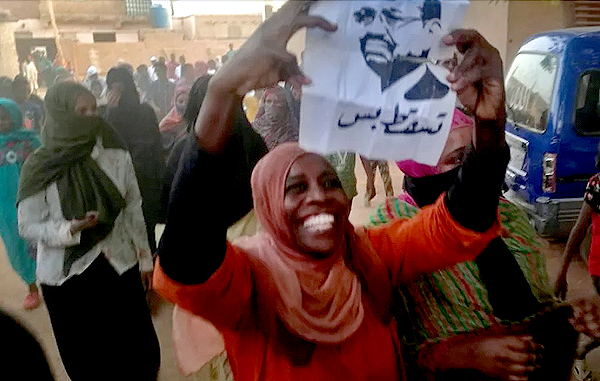 Facebook’s under a lot of negative scrutiny right now, but organized by Sudanese women it may be the weapon which finally ousts the current Sudanese dictator, Omar al-Bashir.
Facebook’s under a lot of negative scrutiny right now, but organized by Sudanese women it may be the weapon which finally ousts the current Sudanese dictator, Omar al-Bashir.
Category: Women’s Rights in Africa
Undeniably Ugandan
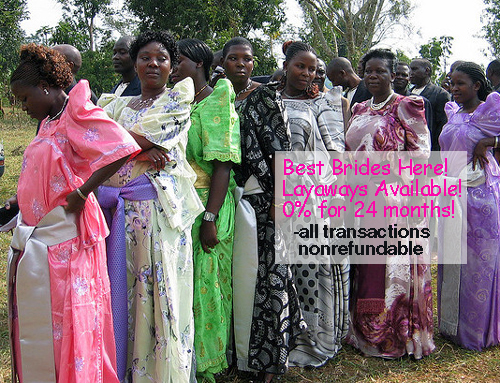 Marriage is now … ‘nonrefundable’ in Uganda. This brings a whole new perspective to trophy wives.
Marriage is now … ‘nonrefundable’ in Uganda. This brings a whole new perspective to trophy wives.
The irony here is that Ugandan womens’ rights groups celebrated this Ugandan Supreme Court Decision, once again proving that Uganda is a mirror universe of the modern day.
Mifumi is a much needed Ugandan NGO that works principally against domestic violence. SALVE international reports that 68% of Ugandan women 15-49 years old suffer serious domestic violence.
This is roughly twice the continent’s average.
The litigation Mifumi brought to the Ugandan Supreme Court was actually to make bride price illegal, essentially ending it. Instead the Supreme Court made the practice nonrefundable. In Uganda and other similar socially transitional societies, if the woman divorces her husband the bride price is refunded.
It’s hard for me to understand how Mifumi thinks this ruling is a victory, as it is anything but. It further institutionalizes a primitive custom in modern garb.
Paying the women’s parents a certain sum in order to marry their daughter is rooted in the folkways of almost all traditional peoples. But the foundation of these folkways is the institutionalized inferiority of women to men. Bride price is simply a component of this larger perception.
Now the court is telling its citizens to look twice before acting, because the act is so important it can’t be undone.
In more modern cultures like ours the man proposing, the man giving the ring, the man standing by the religious leader waiting for his bride to be presented to him … all are vestiges of these early discriminations against women, and Uganda has begun canonizing them in modern terms.
Uganda is one of the saddest stories in Africa, a once vibrant and intelligent nation that was in large part shepherded into a land of super conservatism by American republican leaders.
Click here to begin reading that lengthy story which among other bad outcomes led to the “Kill the Gay” laws that have made the country so infamous.
But like Donald Trump playing to his constituencies’ fears and immoralities, the Ugandan president has navigated his stay in power by playing to the primitive side of his countrymen.
The Ugandan Supreme Court, like all institutions in the country, is a sham controlled by the president. Its August decision on bride price reflects Museveni’s beliefs exactly.
Museveni’s victory is greater than he expected. Now even the primary womens advocacy NGO is in his camp.
Redistributed Marriage
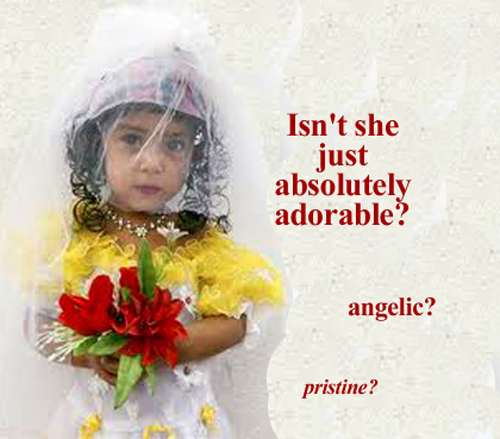 We should be incensed by the privileged often American tourist to rural Africa who characterizes want and poverty as some kind of pristine Garden of Eden that should just be left alone.
We should be incensed by the privileged often American tourist to rural Africa who characterizes want and poverty as some kind of pristine Garden of Eden that should just be left alone.
After her “first visit to Kenya,” a recent American tourist asked in her blog: “The Maasai culture and traditions are pure, so why would you want to change them?”
The question makes me scream: because the Maasai want iPhones, and sleeper posturepedic mattresses, and Brita filters, and slim notebooks and a hope for a better life. Anything wrong with that?
Today, the UN and hundreds of other organizations worldwide, celebrate the Day of the Girl Child which specifically condemns child marriages and which pointedly teases out much of American conservative ambiguities about freedom and individual rights.
Most forced wedlock for girl children occurs in Asia, but a close second is sub-Saharan Africa and specifically in East Africa’s still deeply rural areas.
“Some people sell their daughters at a tender age so they can get food. It’s common but people are silent about it,” a rural Kenyan told Reuters TrustLaw.
The Reuters TrustLaw story interview also described Somali traditions intended to preserve virginity prior to wedlock by arranging very young child marriages.
Now to some that may seem all so noble, right?
Such practices as female circumcision, child marriage and prostitution, and even child slavery are time and again reported in equivocal ways.
“Here’s a troubling fact: 60 million girls world wide are forced into marriage before the age of 18…,” that American tourist wrote in her blog, “But when it comes to cultures that practice child marriages, not everyone agrees that change is a good thing.”
Exactly who is everyone? A few locals you photographed on your $10,000 safari while being completely incapable of speaking to them them in their own language? Might their smiles had something to do with the 200 shillings you gave them for the shot?
I concede there are issues specifically relating to children that teeter on that sharp fence separating individual from human rights and perhaps this contributes to why some Americans believe that poverty and deprivation is fated to “just be left alone.”
Few argue that each child is different, capable of assuming independence at earlier or later ages. The UN and many organizations, though, set 18 years as the first age societies should presume a child is fully able to assume whole responsibility for herself.
Only a few generations ago, that was absurd. My grandmother married at 13 years old, a lost immigrant from Croatia. If she had not married she would likely have died in the mayhem that followed the flow of thousands of immigrants out of Ellis Island.
But that’s the point. That was more than 100 years ago. Although communities in Bangladesh or Mogadishu may not seem much different today than Ellis Island was at the turn of the 20th century, the global awareness of poverty and deprivation has increased enormously.
Fortunately, we all now care more about one another than ever before, if for no other reason than we’ve the tools to see further and deeper, everywhere.
The resilient human spirit, which burns greater in my opinion among the poor and deprived, will find moments in even the most awful situations for satisfaction and happiness. The beautiful nostalgia of my own boyhood may indeed not be so different from that of a successful African businesswoman of her own childhood in a rural hut.
But the effrontery of we privileged to wonder if earlier she might have chosen to remain deprived and under privileged is astounding. I believe it’s evil. It’s racist and the result of greed, a fear that to make things better for others means they will be made worse for ourselves.
Redistribution. Shudder at that word.
And the point there is that redistribution is only the beginning. With more of the world raised from deprivation, the productive capacity will be so remarkably increased that there will be more for all.
So get a grip. Redistribute some of that wealth that got you to Kenya to the poor little Maasai girl who would very much like to visit you in Columbus.
The ERA is in Africa
 Many societies in Africa are daring to challenge the oppression of women in a way that if even partially successful will leave America in their dust.
Many societies in Africa are daring to challenge the oppression of women in a way that if even partially successful will leave America in their dust.
Both the young Kenyan and South African constitutions mandate up to a third of public positions be filled by women and many of the other African countries are not far behind. This is government policy that America refuses to adopt: the ERA was past by Congress in 1972 but withered on the vine for wont of enough States ratifying it.
Last year House Republicans barred women from testifying in hearings to examine contraception. Numerous States like Virginia are thumbing their noses at women while forging proudly ahead with obviously unconstitutional acts of total repression against one gender.
You would think we live in some parallel universe with the modern world. European clients who I guide in Africa simply can’t fanthom what’s happening in America. “I consider myself a conservative,” a recent British client told me, “but America is regressing back to the Stone Age.”
Sunday’s Daily Nation newspaper in Nairobi featured a story about a Somali refugee woman who suffers the same kind of oppression that women in Virginia do. It made me realize why Somalia will be so hard to put back together, and why the American poles are fracturing so far apart.
It was published as a true story, but not one ferreted out by a journalist, rather the result of a letter sent to a columnist. First-person stories are often suspicious, but from my experience in Africa this one rings true. And even if it isn’t true, it gives me personally an explanation for the lunacy running through America, today.
“My name is Khadija Hussein,” the letter to Nation columnist Murithi Mutiga began. “I fled the fighting in Hawl-wadaag district of Mogadishu due to the tribal civil war in 2006.”
Khadija explained that her husband was lost in the fighting, that she was pregnant, and she described the difficult 100 km trek to the Kenyan border to escape. The first person she saw over the Kenyan border was a Ugandan businessman, a Christian, who took pity on her. He helped her get to Nairobi, monitored her pregnancy and actually returned to Nairobi when she gave birth.
They then married. When the Somali community in Kenya learned of Khadija’s marriage to an “unclean kaffir” they vowed revenge.
This revenge wasn’t just the threat of throwing acid in Khadija’s face. The power of the extremist Somali culture went all the way to Uganda, where Khadija’s husband’s business was burned to the ground. This was the way Khadija’s kinsmen restored her lost husband’s “honor and dignity.”
“I won’t and can’t separate from my husband even if he is a Christian,” Khadija ends her story.
Honor and dignity. Which side in this story truly has it, and which doesn’t? Clearly Khadija sits atop the moral high ground, but at great peril.
In America it’s the same. Honor, dignity, freedom … these are the words used by Virginia legislators to mandate vaginally intrusive searches of Virginia citizens to enforce a hyped ideology. They are words that meld into little meaning except selfishness so severe morality is twisted upside down: those who refuse honor, dignity and freedom to all but their own powered elite. This is government intrusion so severe it cripples the culture, much less simply being immoral.
The intransigence of belief becomes the essence of evil.
Fortunately for Africa, Somali is widely considered in the “Stone Age” by the youthful politics and governments governing most African society, and that was exactly how columnist Mutiga framed it: Khadija’s story is unique and alarming by the standards of most modern Africa. For America? Where ranks Virginia?
Given given all the extraordinary women in America in the halls of politics to corporate boardrooms, when Forbes magazine chooses its woman of the month as the creator of panty hose, I fear that Virginia will never become the pariah Somalia is in Africa.
Giants of Gender Equality
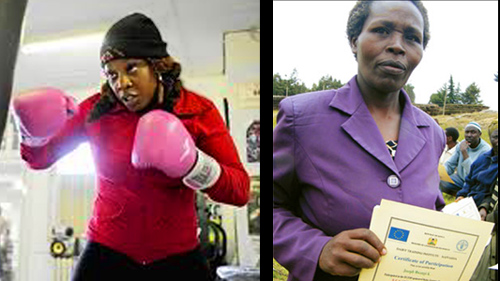 Did you hear about women’s boxing coming to the Olympics? Did you hear about women businesspeople becoming village elders in Kenya?
Did you hear about women’s boxing coming to the Olympics? Did you hear about women businesspeople becoming village elders in Kenya?
Issues today are global, and it’s fascinating to see their actual quantitative positions relative to the developed and developing world. Wealth inequality, for example, seems to be gaining much greater traction in the developed world, where people are much richer, than in the developing world.
Gender equality, in contrast, is gaining much greater traction in the developing world, where people are much more segregated by race and gender, than in the developed world.
I hadn’t heard that women’s boxing was coming to this summer’s Olympics before the NPR report this weekend. And I have to admit that the instant reaction wasn’t one of liberation. When I finally saw Franchon Crews’ biceps I no longer felt an iota of wrongness or inappropriateness to the idea and was left with just a feeling of oddness.
This in contrast to my positive feelings when I read that a business woman in a rural area outside a secondary city of Kenya became Kenya’s first woman village elder.
(The fact is that Kenyan men in general probably feel the same way towards Catherine Cherop and Franchon Crews, respectively, as I feel toward Franchon Crews and Catherine Cherop!)
When I first began working in Kenya forty years ago, women were hardly seen except toiling in the fields and carrying water. In several cases I met families where one of the wives couldn’t speak the language of her husband and probably would never learn it.
When a large rural school (all boys, always back then) announced they had hired my wife as the first ever woman teacher, they rebelled, struck classes and warned her that she would be killed if she walked through the classroom door.
The position of “elder” throughout all of traditional Africa is near synonymous with councilman or alderman, and it was always a man. In fact in almost all the African languages I know, “elder” is translated directly as “old man.”
Among traditional Maasai, to become a senior elder you must first be a junior elder, and to become a junior elder you must become circumcised and then dedicate 5-7 years as a warrior protecting the stock… (among other things).
From the colonial era through modern independent societies, the evolving community political institutions simply assumed a modernized version of the traditional institutions. In today’s Kenya, village elders in the more modernized less traditional communities are now appointed by higher governing authorities.
You apply for the position the same way you’d apply to be appointed to the school or county board; there are some elections, but many are appointed by higher elected officials or higher governing bodies.
Kenya is implementing a new constitution that mandates almost a third of all public elected and appointed officials be women. Of all the radical and creative components to the new constitution, this one drew very little opposition and reflects now several generations of free education irrespective of gender.
But unlike the much longer transition here in America towards gender equality, older Kenyans living today remember as I do that women weren’t just excluded from important positions in the community, but that they rarely appeared!
This enormous change while not a suprise on reflection, to many older Kenyan men causes the same pause I felt when reading about Franchon Crews.
Catherine is the first at the village level! It may seem odd, but the higher up the political hierarchy you go, the more women have already appeared in prominent positions. Kenya has already had a number of elected women Members of Parliament, has had one woman run for president and a number in the top tiers of the judiciary.
But it’s at the grass roots that culture moves slowest, and Catherine’s revolutionary step is in that sense more notable than if she filed to run for president of the country.
It’s another great part of the wonderful story of Kenya’s cultural leaps and bounds. You can read much more about Catherine by clicking here.
Wangari Maathai
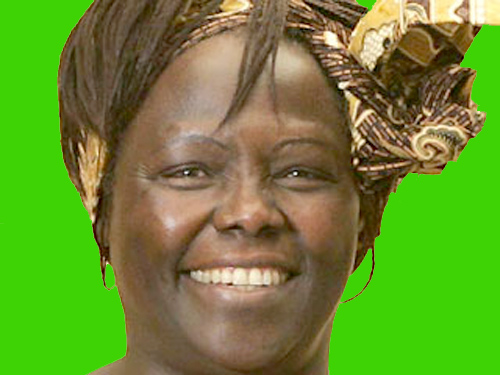 Wangari Maathai was known above all for planting trees, and last week she will be cremated since she insisted she not be buried in a wooden coffin. Few people carry such a presence in life that it continues into their death.
Wangari Maathai was known above all for planting trees, and last week she will be cremated since she insisted she not be buried in a wooden coffin. Few people carry such a presence in life that it continues into their death.
Many discounted Maathai’s 2004 Peace Prize as the Nobel Committee’s trend towards politicizing peace, for Maathai was an activist who often put her foot in her mouth, managed to personally offend almost all her opponents, and relentlessly represented the poor against the rich.
She framed the degradation of the global environment as a rich man’s plot against the poor man. But she never wavered in her beliefs, not when she was repeatedly beaten by police, divorced by her husband for being too “unwomanlike” or ultimately kicked out of government because she wouldn’t toe the party line.
She didn’t do well in groups. She was a lone, articulate and very powerful voice. I’ve read an astounding range of the number of trees that she’s been credited with having planted in East Africa, enough to reforest Jamaica. And clearly it was her voice, not her hands, which got each sprout into the ground.
Her foundations faltered and recovered, her short stint as a Member of Parliament caused more divisions in her own party and arguably jeopardized her own causes, and her inability to assume direction from others meant that journalists were cautious about interviewing her.
But her legacy will prove so much more powerful than her remarkably successful Nobel Price Peace life. She’s a woman in a Third World, so a soldier in the legion of radicals that in my life time has created more women in power proportionately in the Third World than in America. She was instrumental in creating the still debated section of the new Kenyan constitution that mandates a third of all elected officials be women.
She’s was scientist, a rare commodity among upcoming individuals in the Third World. She was divorced, something that condemns many Third World professional women to long if not eternal periods of ostracism. She was notably unstylish, wearing pseudo-traditional garments (mainly because they were green) that never fit well.
And most odd of all, she was green. Green is a concept in business and politics and society that is either a hedge or anathema to fast developing Third World governments that dare to cap their steam stacks or scrub their coal mines at the peril of inhibiting growth.
And that principal characteristic of Maathai places her allegiance squarely on the planet as a whole, not just Kenya. This anti-parochialism is far too lacking, today, in America and the rest of the developed world where more and more we see ourselves in smaller and smaller containers.
There’s no one in my sights who replaces Maathai. But my vision is restricted from outside her world. The final judgment of her legacy will be if others in Kenya and The Third World now assume her role. All of us worldwide should hope so.
The Frustrating Resilience of Early Marriage in Sub-Saharan Africa
By Conor Godfrey
This week the Swedish ambassador to Tanzania, Mr. Staffan Herrstrom, spoke to the Tanzanian daily The Citizen about early and/or forced marriage in Tanzanian society.
He spoke poignantly about his conversations with girls and young women across Tanzania, and outlined some of the social repercussions of forcing girls to wed at such a young age.
Mr. Herrstrom prescribes the following remedies:
· Prevent early marriages, not least by raising the marriage age for girls to the same as for boys: 18 years.
• Prevent early pregnancies i.e. by providing counseling and qualified education on sexual and reproductive health and rights.
• Make sure that all stakeholders, including the police, treat sexual abuse as the crime that it is – and the girl victims as the victims they are. Never ever doubling their burden by forcing them to marry the villains.
• Make sure that every single girl get the right to high quality education – regardless of marriages and pregnancies.
In so far as the ambassador’s ideas support education, I support them.
However, most of these fixes attempt to change an outcome without addressing the context that supports that outcome.
If early-marriage were an issue in Western Europe, it would only take a few years to eliminate the problem.
The health teacher would make sure young women understood the biology of pregnancy, as well as how to use various contraceptives.
Ideally, parents would then reinforce these messages at home and offer guidance and support in topsy-turvey world of teen-dating.
These young ambitious women would also recognize how a sexually transmitted infection or unwanted pregnancy would make their goals harder if not impossible to reach, and hence take ownership of their own choices and sexuality.
This sounds so effortless because the Western European culture supports each step of the process.
In the sub-Saharan bush, even if birth control were available on every corner, even if the law were to make it illegal to marry younger than 18, and even if police were instructed to penalize abuse harshly– I do not think much would change.
The law means nothing unless it reflects valid cultural attitudes.
Perhaps in societies where the rule of law prevails, legal codes have more transformative power, but in the Tanzanian bush, I doubt the official law book means very much.
Here is how I would recommend changing the cultural scaffolding in order to make Ambassador Herrstrom’s first three remedies more potent.
Increase women’s access to credit
: Women’s financial dependence on men supports the status quo. Women are not only better stewards of money, but also more likely to spend that money on family priorities.
Increase women’s access to training for marketable skills
: Financial literacy, artisan skills, agriculture, foreign language, etc… Fathers and family members will be less likely to marry a young daughter into another family if she is a financial contributor.
Health and Sanitation
: Prosperity starts with reasonable health. Reasonably nourished, healthy young women will succeed more often than their mal-nourished peers. They will also work more efficiently, leaving more time for studying and/or income generating activities.
Education
: I could not agree more with the ambassador. A quality primary and secondary education does more to change the cultural context than anything else.
For some, these suggestions will appear to attack the problem of early marriage too obliquely, but I am convinced that is the most effective way.
My friends and family tend to look at early marriage as a strictly moral issue. This characterization, though not without substance, tends to generate blunt solutions.
Outlaw it. Punish Offenders. Declare it in violation of the Universal Declaration of Human Rights.
Ok—but realize that most of the parents who marry their daughters off too young are not evil.
For the most part– neither are the men they marry.
The cultural context that informs their life can absorb and adapt to new information, take stock of changing realities, and chart a new course forward.
That cultural fluidity makes diversity fascinating, and sub-Saharan Africa one of the most exciting places on the planet.
The end of early marriage cannot be willed, or declared into existence. It must work its way through that cultural matrix until one day it becomes painfully obvious that such a practice no longer corresponds to social needs and realities. Unfortunately, this may take generations.